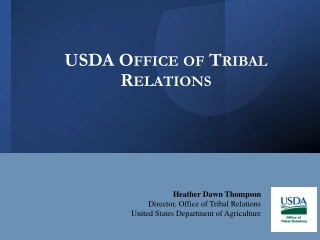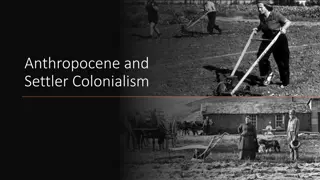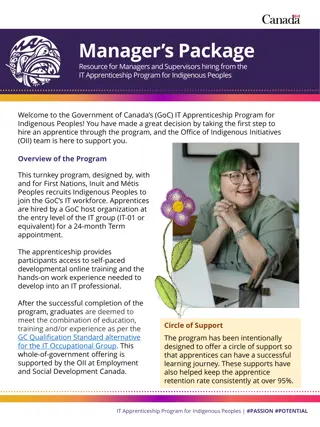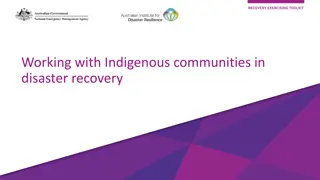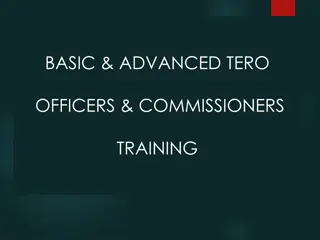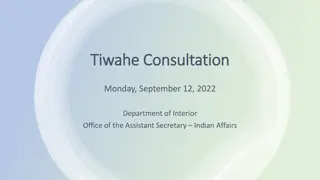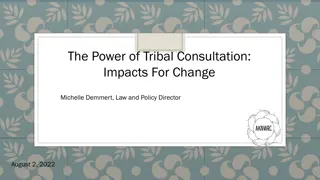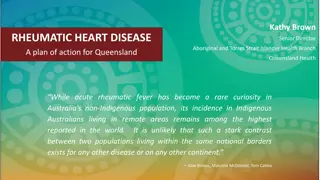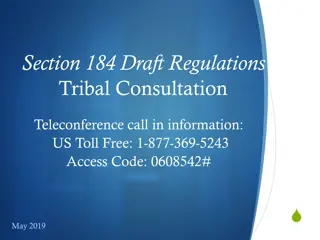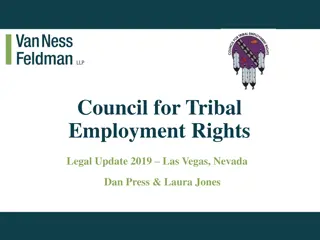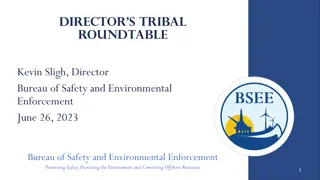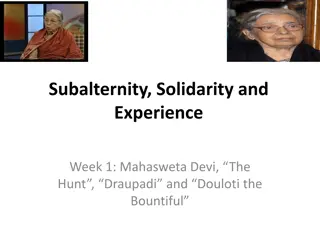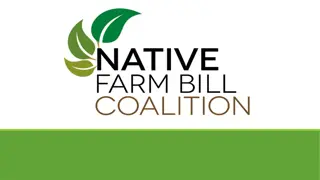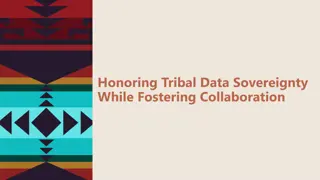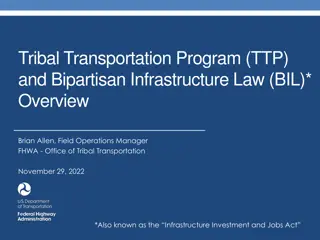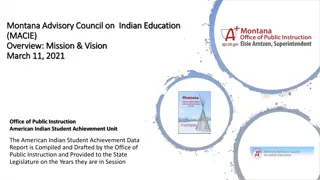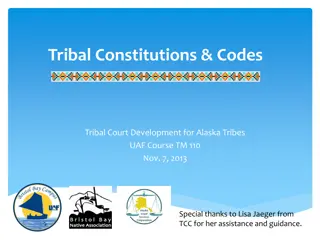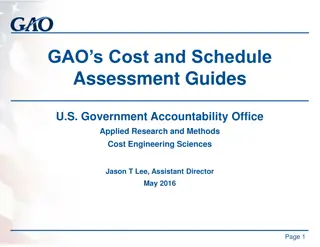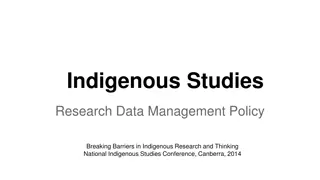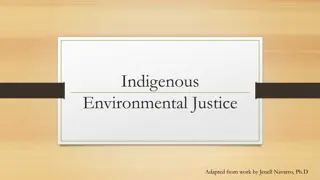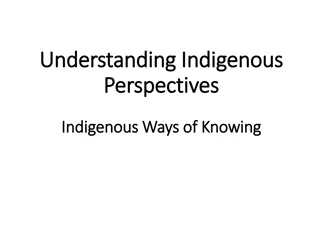GAO Tribal & Indigenous Advisory Council - August 2023
GAO initiated the first-ever Tribal and Indigenous Advisory Council in 2022 to address issues concerning Tribal Nations and their citizens. This council, consisting of 16 members, aims to provide insights and recommendations on emerging topics, diverse perspectives, and working processes. The focus includes establishing advisory roles, guiding GAO engagements, and evaluating criteria aligning with Trust and Treaty obligations.
Download Presentation

Please find below an Image/Link to download the presentation.
The content on the website is provided AS IS for your information and personal use only. It may not be sold, licensed, or shared on other websites without obtaining consent from the author. Download presentation by click this link. If you encounter any issues during the download, it is possible that the publisher has removed the file from their server.
E N D
Presentation Transcript
G AO T R I B A L & I N D I G E N O U S A DV I S O RY C O U N C I L August 2023
A B O U T T H E G AO T I AC In 2022, GAO began the process of forming its first-ever Tribal and Indigenous Advisory Council to provide insights and recommendations on issues affecting Tribal Nations and their citizens. The Council will help guide GAO s future work on vital and emerging issues affecting Tribal Nations, their citizens, and Indigenous people more broadly. Among other things, this may include informing GAO of emerging topics of interest or concern, helping identify relevant stakeholders to ensure GAO work includes a diverse range of tribal and indigenous perspectives, and providing advice to GAO on its processes for working with Tribes. The Council is comprised of 16 members, including leaders from federally recognized Tribal Nations; a leader of a state recognized Tribe; a leader of a Native Hawaiian organization; and experts on topics relevant to Tribal Nations and Indigenous people. SGCETC was selected to help administer and provide technical support to the GAO TIAC.
G AO T I AC M E M B E R S H I P Cheryl Andrews-Maltais, Chairwoman, Wampanoag Tribe of Gay Head Aquinnah (CHAIR) Tehassi tasi Hill, Chairman, Oneida Nation (VICE-CHAIR) John Lowery, Chairman, Lumbee Tribe of North Carolina Sheila Carl, Tribal Council Member, Akiak Native Community Myra Pickering, Second Member, Tribal Council, Otoe-Missouria Tribe Corinne Sams, Member at Large, Board of Trustees, Confederated Tribes of the Umatilla Indian Reservation Kip Spotted Eagle, Councilman, Yankton Sioux Tribe Elizabeth (Lisa) White Pipe, Bull Creek Tribal Representative, Rosebud Sioux Tribe Brenda Smith, Secretary, Kenaitze Indian Tribe Sarah Curtis, CEO and President, Choctaw Global, LLC, Choctaw Nation of Oklahoma Virginia Ginger Fuata, Consumer Board Member, Waianae Coast Comprehensive Health Center, Native Hawaiian Communities Rhonda Harjo, Attorney and former Deputy Chief Counsel (retired), U.S. Senate Committee on Indian Affairs Sarah Lukin, Chief Strategy Officer, Cook Inlet Region, Inc. Kasie Nichols, Director, Office of Self-Governance, Citizen Potawatomi Nation Christopher Adam Red, Auditor, Internal Audit Department, Southern Ute Indian Tribe Justin Ahasteen, Executive Director Navajo Nation Washington Office, Navajo Nation
FO C U S O F F I R ST F E W M E E T I N G S Establishing a role for the GAO TIAC. Providing input into some GAO engagements. Learning about GAO s process and identifying areas for the GAO TIAC to provide valuable input. PRIORITIES FROM THE GAO TIAC MEMBERS: - Establish a Sr. Level Advisor to the Comptroller General for Tribal Issues. - Provide GAO with context needed to understand programs under its review. - Identify areas in need of GAO review and attention. - Evaluate criteria to determine if it aligns with Trust and Treaty obligations and responsibilities. - Incorporate principles of data sovereignty in its process. - Work collaboratively to develop a path forward for removing IHS, BIE, and BIA from its High-Risk list.
E X A M P L E S O F O N G O I N G R E V I E W S (1) (1) What are the key features of federal What are the key features of federal- -tribal shared decision making agreements, and how many of these agreements are making agreements, and how many of these agreements are currently in place? currently in place? (2) (2) What factors if any, do federal natural resource management What factors if any, do federal natural resource management agencies, Tribes, and other Indigenous entities identify as agencies, Tribes, and other Indigenous entities identify as facilitating the development of these agreements? facilitating the development of these agreements? (3) (3) What factors, if any, do federal natural resource management What factors, if any, do federal natural resource management agencies, Tribes, and other Indigenous entities identify as agencies, Tribes, and other Indigenous entities identify as impeding the development of these agreements? impeding the development of these agreements? tribal shared decision- - Tribal Co Tribal Co- -Management Management Agreements (106626) Agreements (106626)
E X A M P L E S O F O N G O I N G R E V I E W S (1) (1) What challenges does Indian Affairs face related to workforce planning What challenges does Indian Affairs face related to workforce planning to meet its increased workload demands under the Inflation Reduction to meet its increased workload demands under the Inflation Reduction Act? Act? (2) (2) What steps has Indian Affairs taken to address these workforce planning What steps has Indian Affairs taken to address these workforce planning challenges? challenges? (3) (3) What additional options does the agency have to address these What additional options does the agency have to address these workforce planning challenges, and what limitations, if any, exist with workforce planning challenges, and what limitations, if any, exist with these options? these options? Indian Affairs' Indian Affairs' Workforce Workforce Planning Planning (106825) (106825)
E X A M P L E S O F O N G O I N G R E V I E W S Tribal citizenship Tribal citizenship for Freedman for Freedman descendants descendants Review of how tribal citizenship is granted to Freedmen descendants. Review of how tribal citizenship is granted to Freedmen descendants. Justice Outcomes Justice Outcomes in P.L. 280 States in P.L. 280 States Review of criminal justice outcomes in states that have jurisdiction over tribal lands as a result of Public Law 83-280 compared to other states.


